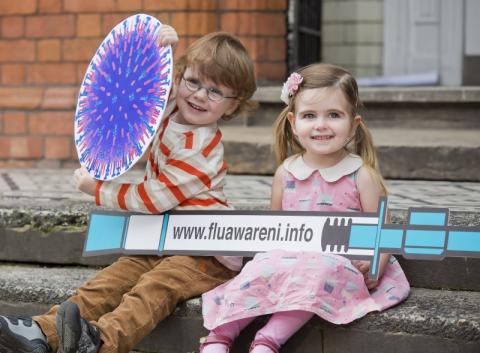Make sure your pre-schooler gets their flu vaccine

The Public Health Agency (PHA) is encouraging parents to get their pre-school children aged two and over vaccinated this autumn as part of the annual flu vaccination programmes.
Pre-school children aged two years and over can receive the vaccination through their local GP surgery. It is offered as a nasal flu vaccine, which comes in the form of a simple spray. This means that parents of these children can ensure their child receives the best protection against the flu by availing of the free vaccine.
Dr Richard Smithson, Consultant in Health Protection at the PHA, said: “We encourage parents and guardians of all pre-school children aged two years and over to get their child vaccinated to help protect them against this unpleasant and sometimes serious illness. It will also reduce the likelihood of passing the disease on to other children or family members, some of whom may be at increased risk of being seriously ill from having the flu.
“The campaign has got off to an excellent start, and already 50% of children in this group have been vaccinated. Pre-school children will be vaccinated at their local GP surgery, so if you haven’t already received a letter from them, we would urge you to make contact with them to find out about their flu clinics.”
The flu virus spreads easily and quickly through the air when people cough and sneeze without covering their nose and mouth, infecting both adults and children alike. Flu can cause the same unpleasant symptoms in children as it does with adults – fever, chills, aching muscles and joints, headache and extreme tiredness. These symptoms can last between two and seven days and for some people can lead to serious illness and result in a stay in hospital.
Dr Smithson continued: “The flu vaccine does not give you the flu. It is there to help protect ‘at risk’ groups because if they get flu, they are more likely to have severe illness and/or develop complications such as pneumonia, which can be life-threatening. But even at best flu can cause considerable inconvenience to the whole family. Getting your child vaccinated means while they are mixing with other children, they are at reduced risk of catching the flu, helping to reduce the likelihood that they will become unwell.”
Most children will receive the vaccine via a quick and painless nasal spray. The nasal vaccine is being used because it has been shown to provide greater protection for children than the flu injection.
All at-risk children should continue to receive the flu vaccine as they have done in previous years. For medical reasons, a very small number of children will not be able to receive the nasal vaccine. They will be offered the usual flu vaccine by injection instead. Parents or guardians can speak to their GP for further advice.
For more information about the flu vaccine for 2014/15, visit www.fluawareni.info, or speak to your GP, nurse or member of staff within the school nurse team at your local Health and Social Care Trust.
The PHA has also produced a short video about the nasal flu vaccine for children, which can be seen at http://fluawareni.info/content/childhood-flu-vaccine.
